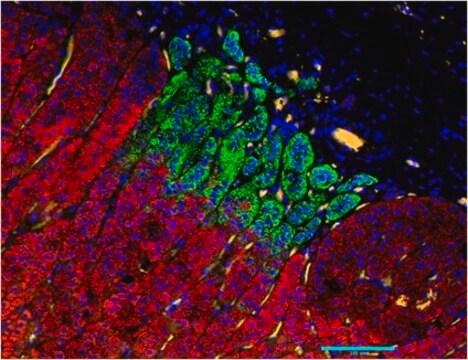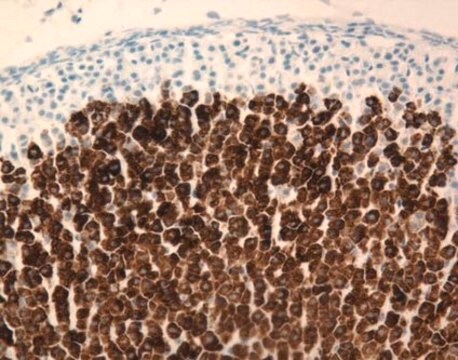MABS1251
Anti-CYP11B2 Antibody, clone 41-17B
clone 41-17B, from mouse
Synonym(s):
Cytochrome P450 11B2, mitochondrial, CYP11B2, Aldosterone synthase, ALDOS, Aldosterone-synthesizing enzyme, CYPXIB2, Cytochrome P-450Aldo, Cytochrome P-450C18, Steroid 18-hydroxylase
About This Item
Recommended Products
biological source
mouse
Quality Level
antibody form
purified immunoglobulin
antibody product type
primary antibodies
clone
41-17B, monoclonal
species reactivity
human
species reactivity (predicted by homology)
mouse (based on 100% sequence homology)
technique(s)
immunofluorescence: suitable
immunohistochemistry: suitable
western blot: suitable
isotype
IgG1κ
NCBI accession no.
UniProt accession no.
shipped in
wet ice
target post-translational modification
unmodified
Gene Information
human ... CYP11B2(1585)
General description
Immunogen
Application
Immunofluorescence Analysis: A representative lot detected CYP11B2 in normal adrenal glands (Gomez-Sanchez, C.E., et al. (2014). Mol. Cell Endocrinology. 383:111-117).
Signaling
Signaling Neuroscience
Quality
Western Blotting Analysis: 2.0 µg/mL of this antibody detected CYP11B2 in 10 µg of hCYP11B2-GFP-expressing HEK293 cell lysate.
Target description
Physical form
Storage and Stability
Other Notes
Disclaimer
Not finding the right product?
Try our Product Selector Tool.
Storage Class Code
12 - Non Combustible Liquids
WGK
WGK 1
Flash Point(F)
Not applicable
Flash Point(C)
Not applicable
Certificates of Analysis (COA)
Search for Certificates of Analysis (COA) by entering the products Lot/Batch Number. Lot and Batch Numbers can be found on a product’s label following the words ‘Lot’ or ‘Batch’.
Already Own This Product?
Find documentation for the products that you have recently purchased in the Document Library.
Our team of scientists has experience in all areas of research including Life Science, Material Science, Chemical Synthesis, Chromatography, Analytical and many others.
Contact Technical Service








